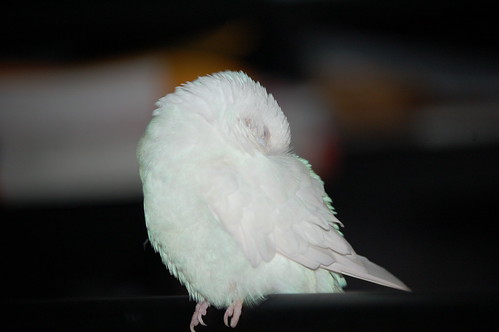
When I first came to live in Orlando, the first month was spent sharing Jamie and Dave’s house with their 11 birds and my flock of 5. I tried my best to integrate into their lifestyle and could only hope for cooperation from my flock. It was easier for them to make many of the changes because they were the out of their element in someone else’s home.
When the Womachs are not working, their birds follow a natural daylight schedule, going to bed at sunset and rising with it in the morning. Most of their birds were out in the aviaries and mine occupied the bird room which is situated right off of their bedroom. The first sounds they heard in the morning were the raspy chattering of my quaker and the cockatiel’s good morning songs which, according to Dave, began promptly at 6:31am. Every day. For a month. Turns out that this was the exact time of sunrise during this time of year, changing by a minute or two as the season progressed.
This is a great schedule for a bird. Natural as can be. However, by about day 15, I’m pretty sure Dave wanted to start putting the quaker in the dryer overnight to get some sleep in the morning, and I was thinking about keeping the cockatiels in an underground cave somewhere because I could hear them clearly all the way upstairs. I love hearing my birds greet the new day, but could they greet it a little later? Say around 9:30 or 10?

After Jamie and Dave left for the tour, I settled into my own routine here at the house. This includes beginning to cover the bird’s cages at night as I had when I lived in Austin. I work varied hours, sometimes not returning home from work until after 11pm. On the days that extend so far into the evening, I need to be certain that I am not awakened at the crack of dawn. I have found that covering the cages is the best way to ensure that I get enough sleep.
However, my selfish need for sleep is not the only reason that I cover the cages. Many years ago I discovered that the solution to a behavioral problem with one of my cockatiels was in ensuring it a peaceful, secure night’s sleep, which came once I began covering the cage at night.
The unwanted behaviors simply stopped following this change. I began covering the cage of my daughter’s umbrella cockatoo, and found her to appear more rested as well. I have covered all my bird’s cages since this time. I know that it offers security to some of the birds and it adds a little more darkness to the morning to allow a good night’s sleep for us all.
Author Patty Jourgensen specializes in avian health, behavior and nutrition and has been working with and caring for rescue birds since 1987.


18 comments
Leave a comment